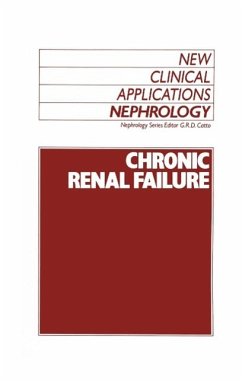
Living with renal failure (eBook, PDF)
Proceedings of a Multidisciplinary Symposium held at the University of Stirling, 7-8 July, 1977
Redaktion: Anderton, J. L.; Jones, D. E.; Parsons, Frank M.
Versandkostenfrei!
Sofort per Download lieferbar
40,95 €
inkl. MwSt.
Weitere Ausgaben:

PAYBACK Punkte
20 °P sammeln!
The management of chronic renal failure by dialysis and transplantation has now become an established form of treatment in many parts of the world. However, these forms of treatment have brought with them problems in relation to the selection of patients, economics, clinical problems such as hypertension, encephalopathy, anaemia and renal bone disease, and psychological and social problems. The management of haemodialysis has changed over the years with developments in dialysers, vascular access and the duration of dialysis. Although the overall survival from renal trans plantation has changed...
The management of chronic renal failure by dialysis and transplantation has now become an established form of treatment in many parts of the world. However, these forms of treatment have brought with them problems in relation to the selection of patients, economics, clinical problems such as hypertension, encephalopathy, anaemia and renal bone disease, and psychological and social problems. The management of haemodialysis has changed over the years with developments in dialysers, vascular access and the duration of dialysis. Although the overall survival from renal trans plantation has changed little in the past four or five years, there are hopes of improvements in relation to tissue typing and enhancement. Perhaps the most important aspect in the management of chronic renal failure is the multi-disciplinary approach. Nursing and medical staff work closely with dialysis technicians, engineers, dietitians, local authority per sonnel, social workers and with the relatives of the patients. The symposium was planned to draw together representatives from all disciplines involved in the care of patients with chronic renal failure. One of the most relevant sessions was that in which two patients with chronic renal failure described their experience.
Dieser Download kann aus rechtlichen Gründen nur mit Rechnungsadresse in A, B, BG, CY, CZ, D, DK, EW, E, FIN, F, GR, HR, H, IRL, I, LT, L, LR, M, NL, PL, P, R, S, SLO, SK ausgeliefert werden.












